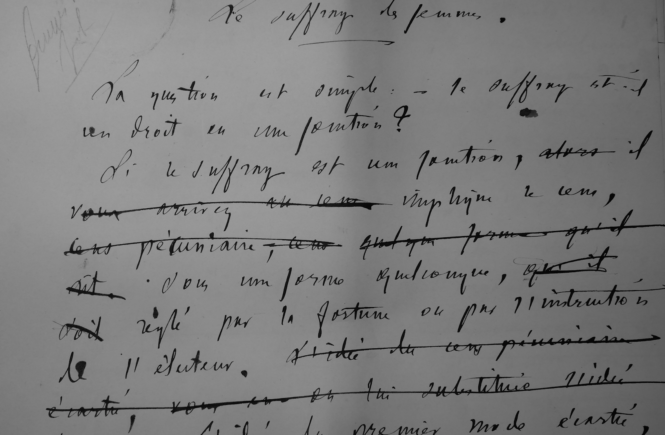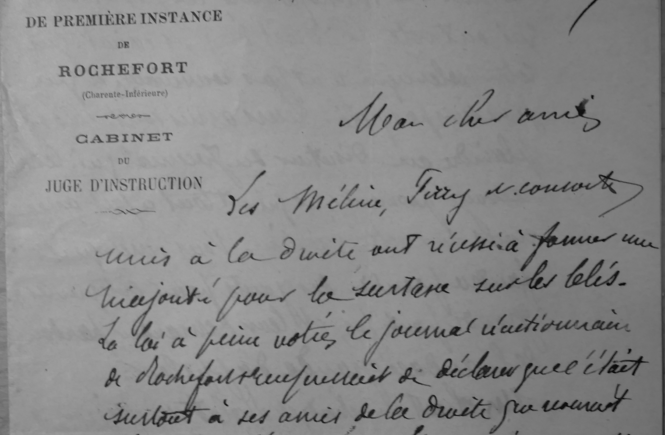, The Society of Tomorrow: A Forecast of its Political and Economic Organization, ed. Hodgson Pratt and Frederic Passy, trans. P.H. Lee Warner (New York: G.P. Putnam’s Sons, 1904). French version is : Gustave de Molinari, Esquisse de l’organisation politique et économique de la Société future (Paris: Guillaumin, 1899).
The Economic and Socialist Conceptions
of the Society of the Future
The political and economic organisation of society has, hitherto, varied according to the mental equipment of the individual, the risks of destruction threatening each society, the comparative development of production—the conditions of existence, in fine. These conditions have been profoundly modified, particularly during the last century, by the progress which has transformed the arts of production and destruction, until a political and economic organisation suitable to the past is no longer adapted to modern needs. This lack of adaptability may be considered as the first cause of modern socialist propaganda, since it has precipitated a crisis whose effects have chiefly fallen on the class which subsists on the product of its daily toil. More, it has produced the systems of social reorganisation preached by Saint Simon, Fourier, Karl Marx, and a host of Dei minores.* However numerous, these systems all have one common point—they ignore the operation of those laws of nature, which have determined human progress in the past and will continue to do so until the end. Were these propagandists to confine themselves to theory little harm would result, but they generally endeavour to impose their ideas on society by, first of all, seizing that sovereign power which is the attribute of government. Those who are ardent attempt to do this by purely revolutionary means; the more moderate or timid by more or less legal methods. But government alone can reform society, and that by breaking down all resistance.
Nowise denying the evils, disorders, and instability, following this crisis in the course of progress, the economist, who seeks to find the remedy, must battle with the false doctrines of the socialist invader. The struggle has benefited either party. It has given the economists an opportunity for a closer examination of the ills which afflict the “most numerous and poorest class”—to quote Saint Simon—with the result that they have been able to attribute them to the proper cause. The socialist, on the other hand, having begun by ignoring economics and, indeed, every moral science, has learnt the necessity of studying them. However inadequate the scientific spirit in which these men approached the subject, they have learned to dissociate socialism from some of its most gross errors, and a certain number have even forsaken the primitive idea of their creed—that the State must reconstitute and even absorb society. So far advanced from their first position are the more enlightened socialists, that it does not seem idle to hope that further and more profound study will result in an alliance between the leaders of the movement and the professor of political economy proper.
It was in this hope that, fifty years ago, the present author addressed the following appeal to all sincere socialists:—
“Economist and socialist, we may be adversaries, but our ideal and purpose is one. We seek a society in which there will be no stint in the production of all that is needful, whether to support or to embellish human existence. We seek a society where the distribution of these products between their creators will accord with the dictates of pure justice. We seek—in one word—an ideal that may be stated in two words, Justice and Plenty!
“None among you will deny this truth, and, if we say that we seek by different paths, that is the sum of our difference. Your way lies along the obscure and hitherto unexplored defile of the organisation of labour, ours down the broad, well-trodden highway of liberty. Both, we seek to lead a hesitating and halting society, nations looking—but in vain—towards the horizon in hopes of a new column of light to lead them by the way whereon it guided the slaves of Pharaoh to a Land of Promise.
“Now, you proscribe the freedom of labour and curse political economy. Will you continue to do this, or will you rally frankly to our flag, and employ all the precious endowment of your nature—your physical and intellectual powers, to achieve the triumph of our common hope, the cause of liberty? For we can prove that our cause is common. We can prove that all the ills which you ascribe to liberty—or, to use an absolutely equivalent expression, to free competition—do not originate in liberty, but in monopoly and restriction. We can prove that a society truly free—a society relieved from all restriction, all barriers, unique as will be such a society in all the course of history—will be exempt from most of the ills, as we suffer them to-day. We can prove that the organisation of such a society will be the most just, the best, and the most favourable to the production and distribution of wealth, that is attainable by mortal man.
“When we prove all this—and we can do so—I cannot think that you will hesitate as to your choice. Certified that you mistake the true origin of the ills which afflict society, and the remedies for those ills—certified that the truth is on our side and far from yours—no petty vanity, partisanship of propaganda or system, will retain you on the shores of error. Your hearts will no doubt be sad. You will bid a regretful adieu to the dreams which have enchanted your minds, dreams on which you were nurtured and in which you went astray. But in the end you will overpass their vain though lovely imaginations, and, surmounting your natural repugnance, you will come to us. And we—by God, we will do likewise, can you lighten our feeble intelligences with but one gleam of that true light which shone on Saint Paul: can you show us that the truth is with socialism, and not with political economy. We uphold our system, but only as we believe it the true and the just. Prove us, then, that our gods are feeble idols of wood and stone, and we burn them; leave, with no reservation, the altars of our adoration, rejecting the accepted return to the rejected, and worship whence we beforetime went forth.
“One with the other, we stand above the prejudice of party, taking that term at its narrowest. The sphere of our sight is broader, the lift of our wings too great. Truth, justice, the true utility—these be our immortal guides through the obscure circles of mortal knowledge! Humanity—she is our Beatrice!…”27
This appeal, brimming as it is with the naïve confidence of youth, is shown premature in the event. But if none gave ear to it, stillborn in a time unripe, it may yet find hearers. And socialism, allied to the economist, may yet, is that alliance, surmount the barriers of egoistic and blind self-interests, barriers outworn yet clinging about the neck of a transformation which is essential if the political and economic organisation of society is to adapt itself to the changed conditions of the Societies of To-morrow.


